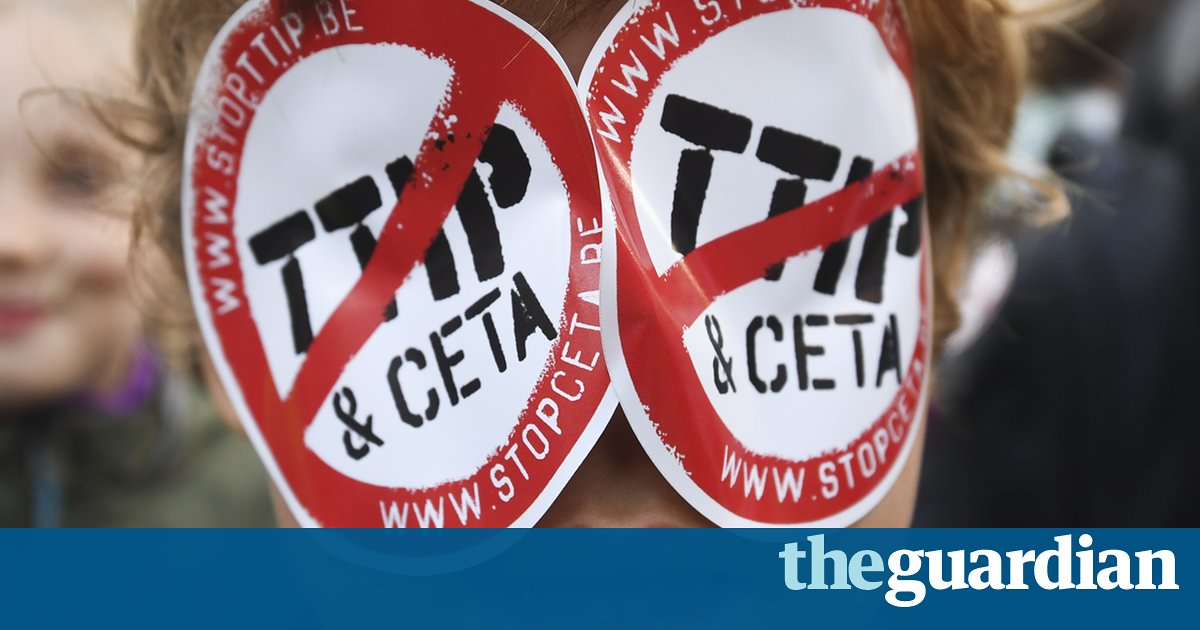TTIP protests on the streets of Germany With the window for finding an agreement closing, officials at the European commission hope to lock in as much progress as possible before Obama goes. Next weeks talks will focus on developing compatible standards in key industry sectors, spanning pharmaceuticals, engineering and IT.
Regulatory differences are seen as an easier nut to crack than other disputed issues, such as allowing European companies to bid for US public-sector contracts or protecting European cheese and champagne from imitators. We have not tried to hide the fact that these differences are quite large, a commission source said.
While technical talks grind on, the political outlook has become stormier. Trade ministers from seven countries, including France and Germany, raised a variety of doubts and concerns last week. The UK was in a rival group of 12 countries that signed a letter in favour. The supporters, which also include Italy and Spain, said they were ready to sign a similar deal with Canada on 27 October.
John Springford, head of research at the Centre for European Reform, said it was hard to see TTIP talks resuming in 2017. The window of opportunity for getting TTIP done was before we got into the US election campaign, and certainly before the French and German elections got under way [in 2017]. I think that window of opportunity is now closed.
In an acknowledgement that it has lost the public relations battle on TTIP, the European commission is preparing to release a tranche of data showing the benefits of transatlantic trade for towns and cities across the EU. Advance statistics from the data set, which will be published in late October, show that 30,000 British companies export to the US, 93% of which are small businesses.In a speech this week , the international trade secretary, Liam Fox, argued that the UK stood on the verge of a golden age of free trade , where a post-geography trading world meant we are much less restricted in having to find partners who are physically close to us.
The MEP, who sits on the European parliaments international trade committee, led Labour MEPs in voting against a motion on TTIP, because of concerns over giving too much power to foreign investors and diluting environmental and health standards. A supporter of the UK remaining in the EU, Kirton-Darling argued it would be preferable to be in a reforming EU trade policy than outside.
It is clear that the EU of 500 million people negotiating with the US is a much more balanced relationship than 65 million people in Britain negotiating with the US. The danger is that we would be given a fait accompli by Washington and the pressure would be intense to accept what was on the table, because what else would be available when we have left the EU?
TTIP: three stumbling blocks Special court
One of the main worries about TTIP and existing trade rules is the power given to large corporations to sue governments. These fears were crystallised when tobacco company Philip Morris used an international trade-dispute-resolution system, in an attempt to overturn Australias plain-packaging laws for cigarettes . In response, the European commission called for a special trade court to replace the current system, which dates back to the 1960s. The commission says its proposed Investment Court System would be more transparent and efficient. But critics argue it is no better than the current system. The US is unenthusiastic about the EU plan and has expressed doubts about allowing companies the right of appeal.
Kentucky-Fried Bratwurst
Under EU rules, real Champagne only comes from the vineyards around Reims; Feta cheese belongs to Greece; and the true Cornish pasty cannot be made in Devon (or anywhere else). TTIP critics fear the deal would open the door to Kentucky-Fried Bratwurst and a slew of imitators, as EU labels on protected geographical indication have no status in US law. President Franois Hollande has vowed to block any deal, which would put our agriculture in difficulty. The French government has also voiced concern about dilution of environmental standards.
Buy American
While Europeans are worried about their cheese and ham, Americans want to hang on to protections for their iron and steelmakers. Reciprocal access to the lucrative sector of government contracts is a potential deal-breaker. The EU side argues the US has not done enough to allow European companies to bid for US government contracts. Buy American became US policy in 1933 during the Great Depression and was also a significant aspect of the 2009 Stimulus Act. The policy prevents foreign firms from bidding for many federal and state construction jobs.

